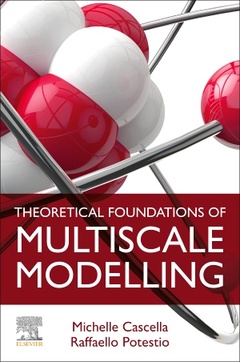Theoretical Foundations of Multiscale Modelling
Auteurs : Cascella Michele, Potestio Raffaello

Theoretical Foundations of Multiscale Modelling aims to address thermodynamical and statistical mechanical foundations of methods commonly employed, highlighting the potential and limitations of each approach. Starting with an overview of the basics of statistical mechanics, the book's chapters illustrate the general theory of molecular modelling, the concepts and methods for the study of complex molecular systems, key strategies employed to perform computational calculations and simulations, recent, cutting-edge tools of the trade, and a selection of case studies that highlight multi-scale modeling, multiple-resolution simulation methods, and machine-learning applications. Drawing on the experience of its expert authors, this book is an insightful guide for all those learning, applying or interested in exploring multiscale modelling methods for their own work. Multiscale modelling approaches can provide valuable insights to researchers across a broad range of fields, but the interdisciplinary applicability of these approaches means both new learners and experienced researchers may not have a clear understanding of the theoretical and computational fundamentals underpinning these methods.
1. Introduction to soft matter PART I - Statistical mechanics and simulation 2. Foundations of Classical mechanics 3. Foundations of Statistical Mechanics 4. Modelling atomic systems 5. Simulation and sampling 6. Stochastic dynamics 7. Free energy calculations PART II - Coarse-graining 8. From critical phenomena to coarse-graining 9. Coarse-graining molecular systems 10. Structure and thermodynamics from spatial distribution functions 11. The relative entropy method 12. Boltzmann Inversion, Iterative Boltzmann Inversion and Inverse Monte Carlo 13. Multi-scale coarse-graining and force matching PART III - Case studies 14. State of the art approaches to multi-scaling 15. Applications: Simple liquids 16. Applications: Macromolecules PART IV - conclusions and perspectives 17. Conclusions and perspectives
Raffaello Potestio received his PhD in Statistical Physics from the International School for Advanced Studies (SISSA-ISAS) in Trieste, Italy, in 2010, with a PhD Thesis on coarse-grained models of protein structure and interactions. In November 2010 he joined K. Kremer's group at the Max Planck Institute for Polymer Research (MPIP) in Mainz, Germany, as a postdoc. Between August 2013 and December 2017 he has been Group Leader of the Statistical Mechanics of Biomolecules group. In 2017 he was awarded an ERC starting grant and moved to the University of Trento, Italy, where he is tenure track assistant professor In Physics. His main research interests are the development and application of coarse-grained models and coarse-graining strategies for soft matter, in particular biologically relevant systems, and the study of topologically self-entangled biopolymers.
- Follows a pedogeological path, taking readers from the simplest to the most complex notions
- Rigorously shows the connections between theory and modeling, providing a critical understanding of commonly used models and their level of applicability
- Provides a rich list of case studies to demonstrate the application of theoretical principles in practice
Date de parution : 11-2024
Ouvrage de 500 p.
15x22.8 cm



